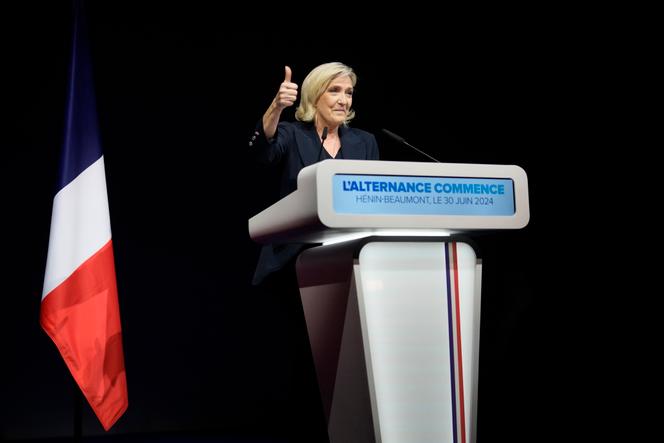


France's far right made huge gains the first round of pivotal legislative elections on Sunday, June 30, with President Emmanuel Macron's camp coming in only third behind the left-wing Nouveau Front Populaire alliance, according to initial estimates. But the shape of the next Assemblée Nationale will only be known after the second round of the snap poll, on July 7.
Together with its right-wing allies, the far-right Rassemblement National garnered 33.5% of the votes according to initial estimates, the party led by Marine Le Pen and Jordan Bardella almost doubled its score from the 2022 legislative elections (17,3%
). Never before had the far-right party, founded in 1972 by Jean-Marie Le Pen, broken the 20% barrier in a parliamentary election. Le Pen's heirs are now closer than ever to power.
President Emmanuel Macron, who called the snap elections on June 9 after his side's defeat in the European elections, sees his coalition rank third, with 20.3%, as the alliance of left-wing parties, the Nouveau Front Populaire, reached 28.1%, according to the estimates. The outgoing majority suffered a less severe defeat than expected, but its third-place finish sealed the bitter failure of Macron's political gamble.
Put together in a hurry, the Nouveau Front Populaire left-wing alliance outperformed its predecessor, the NUPES coalition in the June 2022 parliamentary elections. In the first round of the snap elections, the left won 28.1% of the vote – compared to 31.6% in 2022.
Voters in the 577 French constituencies will have to choose next Sunday between the best-placed candidates from the first round – usually two, sometimes three or even four in districts where additional candidates meet the criteria to qualify. But parties can also decide to withdraw their candidates and back the ones best placed to beat the far right, regardless of their affiliation. This is called the "republican front". In recent years, however, this tradition has broken down. Will it be applied this time around? And will parties instruct their voters to block the far right? These will be the main issues at stake ahead of the second round.
Immediately after the first estimates were published, Macron called on voters to block the far right in the second round. "Faced with the Rassemblement National, it is time for a large, clearly democratic and republican rally for the second round," he said. And prime Minister Gabriel Attal urged voters not to give the far right "a single vote."
Jean-Luc Mélenchon, the leader of the radical left party La France Insoumise (LFI), called on left-wing candidates who ranked third but still qualified for the second round to withdraw, in order to support the better-placed candidate to beat the RN. "Not one vote, not one seat more for the RN," he said. Leaders of the other left-wing parties issued similar calls.
The right-wing Les Républicains (LR) party said it would give no instructions to its voters for the second round. "We combat the outrageousness of a far left dominated by La France Insoumise, which wants to demolish our institutions, deconstruct our civilization," the party said in a statement. "The Rassemblement national is not a solution either for France, [it will] lead to chaos," it added.
While estimates of the general power balance between the major political parties − expressed in percentages − are generally close to reality, projections of the number of potential seats for each party are much less accurate on the evening of the first round, because the outcome of the second round depends so much on the specific situation in each constituency.
With the French facing their most polarizing choices in recent history, turnout soared, with 65.8% casting their vote, according to the initial estimates. The final turnout in the last parliamentary elections in 2022 was just 47.5%.
